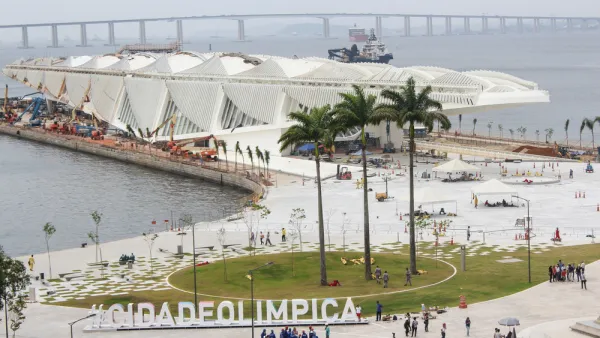This article from Metropolis Magazine features a tour of Beijing as it prepares for the Summer Olympics. The scale of development is almost overwhelming, according to author Philip Nobel.
"It took a visit to that nondescript addition for me finally to see what is possible when modern technology, capitalist zeal, Communist control, national ambition, and a bottomless unprotected labor pool combine in the service of building. You can get things done. That moment also opened up for me the profound strangeness of the city. The shoulder-to-shoulder towers on the wide ring roads that give each the scale of Las Vegas Boulevard? All brand new. The wooded margins of every highway? The elaborately greened interchanges? All fresh, and all false, every tree imported and planted to mask Beijing's essential filthiness in advance of the coming-out party planned there this summer."
"The Olympic site itself no longer seemed like a lost cause. Touring it before, I thought there was no way the buildings would be finished and the vast dust bowl paved and tricked out with its planned parks, roads, and watercourses before the games began on August 8. It certainly will be-Herzog & de Meuron's intoxicating "Bird's Nest" stadium is now in punch list-but such sprinting has a cost. The New York Times reported in late January that six construction workers have died on Olympic sites in the last five years; the Times of London had previously put the number at ten. A long article on the official Beijing 2008 Web site was posted in early February, likely in response to all the bad press. The protesting-too-much begins with the headline, 'Workers Enjoy Good Services at Olympic Venue Sites.'"
"The current transformation of Beijing also includes the wholesale razing of many of the old residential quarters in the central city, the residents themselves relocated to vast new tower blocks on the urban edge-deluxe hutongs in the sky-or simply made homeless without contingency. Several of the old neighborhoods along the tourist routes near the Forbidden City have been preserved in sterilized form. But there's little opportunity here for outsider self-righteousness; the effects of such changes are not very different than they would be in any American city: low-rent buildings replaced by expensive ones through economic churn, people displaced, quaint neighborhoods locked in amber. Though having two invisible hands-the will of an all-powerful government plus the inexorable pressure of capital-seems to streamline the process."
FULL STORY: Delirious Beijing

Analysis: Cybertruck Fatality Rate Far Exceeds That of Ford Pinto
The Tesla Cybertruck was recalled seven times last year.

National Parks Layoffs Will Cause Communities to Lose Billions
Thousands of essential park workers were laid off this week, just before the busy spring break season.

Retro-silient?: America’s First “Eco-burb,” The Woodlands Turns 50
A master-planned community north of Houston offers lessons on green infrastructure and resilient design, but falls short of its founder’s lofty affordability and walkability goals.

Test News Post 1
This is a summary

Analysis: Cybertruck Fatality Rate Far Exceeds That of Ford Pinto
The Tesla Cybertruck was recalled seven times last year.

Test News Headline 46
Test for the image on the front page.
Urban Design for Planners 1: Software Tools
This six-course series explores essential urban design concepts using open source software and equips planners with the tools they need to participate fully in the urban design process.
Planning for Universal Design
Learn the tools for implementing Universal Design in planning regulations.
EMC Planning Group, Inc.
Planetizen
Planetizen
Mpact (formerly Rail~Volution)
Great Falls Development Authority, Inc.
HUDs Office of Policy Development and Research
NYU Wagner Graduate School of Public Service


























